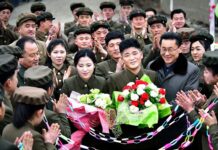North Korea, which had most recently moved to create an atmosphere for discussion by attending a meeting of experts vis a vis the possibility of an eruption of Mt. Baekdu, suddenly performed a volte face on Saturday by releasing a statement cancelling the Hyundai Group’s exclusive rights to tourism at Mt. Geumgang, tipping inter-Korean relations back into the freezer and causing confusion as to the North’s aims.
In the statement dated April 9th, North Korea’s Asia-Pacific Peace Committee stated, “There is no further prospect of Mt. Geumgang tours being resumed,” and added, “We are cancelling the article regarding the exclusive right given to Hyundai in the agreement on tours of Mt. Geumgang concluded with the Hyundai Group.”
It was an agreement former Hyundai President Chung Ju Young launched with Kim Il Sung during a visit to North Korea in 1989. Later, in 2000, Kim Jong Il gave the exclusive rights for infrastructure and tourism to the Hyundai Group. In North Korea, where the leader’s words are of paramount weight, this makes the agreement very hard to cast aside.
Given this backdrop, some interpret the measure as a strategic one to pressure the South Korean government; yet, the fact is that there will not be much practical pressure since the tours have already been on hold for nearly three years following a shooting in the summer of 2008.
Furthermore, North Korea has already attempted to pressure the South Korean government by freezing government-owned real estate at the site and then endeavoring to attract foreign tourists, a situation to which this adds relatively little.
Equally, last year the South Korean government sent an official letter to the director of the China National Tourism Office to explain that North Korea had violated a properly concluded contract and asked for understanding to be shown, and the Chinese government is unlikely to want to make a public show of breaking international legal practice by allowing tourists to visit in large numbers, even in the unlikely event that they wish to go.
“North Korea is not making its moves as well as in the past” was the evaluation of one North Korean expert this weekend. Indeed, he called it a bad move which will place the Chinese government, which is trying to move towards Korean Peninsula discussion, in a more difficult spot.
However, Kathleen Stevens, the U.S. Ambassador to South Korea reported a different atmosphere in comments to the press on April 7th, saying, “Various contacts and efforts are being made for a sincere dialogue with North Korea. We expect a positive situation to be created within one or two months.”
Given that the South Korean government has been consistent in demanding acknowledgement and an apology for the Cheonan incident and bombardment of Yeonpyeong Island as preconditions for dialogue, and no specific public progress has been made between the two Koreas, Stephens comments could imply that behind the scenes contacts have been more productive.
Or, as one anonymous researcher from a national policy research institute put it, the U.S. Ambassador may have been speaking directly to South Korea; “It cannot be seen as a difference of opinion between South Korea and the United States…. but it could be a message from the U.S. administration to say that the South Korean government should take active measures to resume discussions with North Korea,” he said.
“The South Korean government also has the will to discuss,” the researcher went on. “Therefore, now could be the time to consult each other about how to resolve the issue of an apology for the Cheonan incident and bombardment of Yeonpyeong Island via under the table contact.”




















